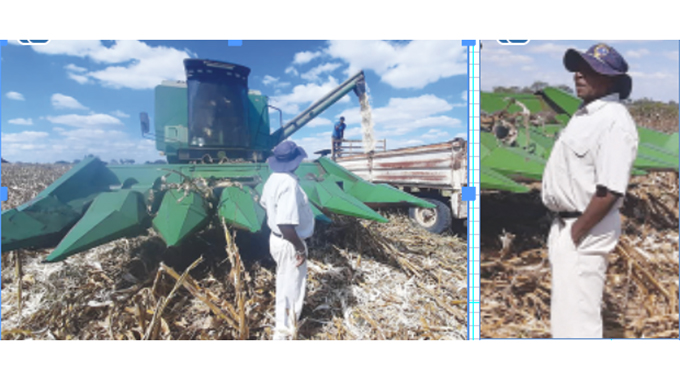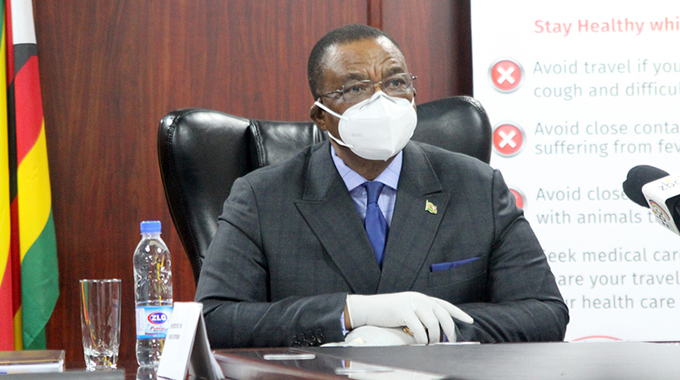Land reform: Success story of Brig-Gen Kanhanga

Freedom Mupanedemo
Features Writer
It is mid-morning and I find myself at a farm outside Mvurwi town in Mashonaland Central Province and what shocked me was the organisational and professional running of the farm.
I need five minutes of asking something, but I end up spending half the day there.
A 90 horse-powered tractor crawls with tenacity with a huge truckload of shelled maize, its groggy engine vocals, singing the tempo of a beast of burden.
Since mid-morning the tractor has been offloading grain, again and again, courtesy of a combined harvester hired to harvest the more than 40 hectares of maize.
To the left of the homestead, a tobacco grading shed totters with age, but inside skilled men and women, battle with mounds and mounds of tobacco stashed in slate packs.
Across a small river of chatting waters, Brigadier General Walter Kanhanga (Retired) has planted more than 30 hectares of forest, mainly the gumtree species.
A spitting distance to the east of the well-manicured farmhouse, three centre pivots water a thriving winter wheat crop, whose lush greenery speaks to nothing, but a great future.
Welcome to the farm of recently appointed Zanu-PF Politburo member, Brig-Gen (Rtd) Kanhanga.
Soft as wool, and ever smiling Brig-Gen (Rtd) is a success story of man who indeed exchanged the gun for a plough shear.
Situated on the outskirts of Mvurwi Town, on the foot of the Great Dyke Range, the farm is a good example of how some people benefited from the land reform when they indeed wanted to farm.
“My day starts 5am with a check on everything and then look at the work schedule.
“I only come back home mid-morning for breakfast, of course after satisfying myself that everything is going on as per plan.
“All what you see here is a product of hard work. I put every ounce of energy I have on this farm. This orchard of bananas, mangoes, apple, guava and oranges was not here when I came. I planted all this. That huge gumtree plantation I also planted,’’ he says with a soft but assuring voice.
During war of liberation, Brig Gen Kanhanga was known for his darting runs and diminutive crawls and clever under cover tactics and a diplomat too.
Having joined the liberation struggle at a tender age Brig Gen Kanhanga did not know any other trade but executing the struggle to liberate Zimbabwe.
“The land question was at the core of the struggle. We really needed the land and I have always wanted to prove to everyone that black people can farm, even better than the whites.
“As far as am concerned there is no going back on farming and am grateful to the land reform programme.
“My farm tells you a story on its own. Seeing is believing.”
At Independence in 1980 following years of protracted fight, Brig Gen Kanhanga is one of those cadres who remained behind in the trenches in Mozambique in case, the Rhodesians trick the liberation movements and re-start the war.
He was to come back home in 1981 and then spent many more years into the arm, rising through the ranks.
The land question was the major driver as patriotic majority of Zimbabweans sought to reclaim back the land from a minority white settler regime, he insists.
“Like I said before, the major reason we went to war was to reclaim our land, other freedoms were also necessary but the key issue was the land question.
“Now we have the land and we are working on it. It’s the best things that has happened to me. I am forever grateful.”
And when the land reform finally came around 2000, Brig Gen Kanhanga’s long dream to have the land back in the hands of the majority came true.
Named KwaBrig Farm, the farm is one of the best productive land in Mashonaland Central. And many are even left to envy the former guerrilla war fighter’s farming prowess.
“I am now a full time farmer and I am doing my best. Actually farming is my life now and I am now showing my other side,” he said.
With a farm spanning about 200ha, Big Gen Kanhanga is proving to be a versatile farmer who is also into livestock production with cattle and sheep.
“I had to set up systems to make things work here. I have mechanised the farm as you can see all these tractors, vehicles, irrigation system.
“It is not easy to do so, but I owe it to my wife and children and the Government of Zimbabwe to be where I am today.
“I want to make Zimbabwe proud of the land reform programme and I am open to new ideas,’’ he said after granting me a tour of his farm.
My visit to his farm, although my accident, was not in vain.
On one end, a blue heavy duty combined harvester drooled, ripping through a vast field of maize that eyes could not locate where it ended. A tractor pulling a 15 tonnes of maize waited as the harvester plucked, shelled and intermittently vomited the harvested grain. Pure commercial farming at its best.
“Tobacco is our major cash crop at this farm. It is our major activity here as you can see we have a lot of contract workers, about 100 of them at this peak grading time,’’ said the soft spoken Brig-Gen Kanhanga with an infectious smile.
“We are also harvesting maize and thanks to the good rains, our yield will be improving this year with at least 10 plus tonnes of maize per ha,” he said.
He thanked the New Dispensation for availing inputs to the farmers on time.
“We are very grateful to the New Dispensation and President Mnangagwa for availing inputs and other support programmes. Finally, the world will soon see that the land reform was not in vain.’’










Comments